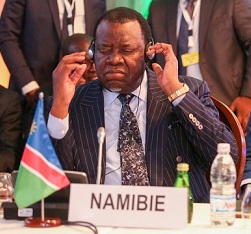
Anti-poaching drive gets boost from local partners – MEFT Dog Unit contributes to the fight

The Ministry of Environment, Forestry and Tourism’s anti poaching campaign specifically the Dog Unit, was this week beefed up when they received a Toyota Land Cruiser Double CAB V8 from Standard Bank as well as donations from other organisations.

The other organizations namely SWAVET, MDS Animal Health and Rhino Park Private Hospital also donated vital veterinary amenities for the dogs which included drugs and food to the Canine Unit.
Speaking at the handover, Minister Pohamba Shifeta said the donation comes at a time when the country is faced with the impact of COVID 19.
“Tourism, which is the principal economic force for wildlife conservation, and which pays for the conservation protection costs, is particularly hard hit. This donation also comes at a time when the country is experiencing crime against wildlife particularly rhinos, elephants and pangolins which is sparked by international trade of their products,” he said.
According to Shifeta, Namibia’s anti-poaching canines have contributed to the fight and have been successful in 52 cases across the country since their deployment in 2017.
The recent one being the arrest of suspected rhino poachers on a farm neighbouring the Waterberg Plateau Park, he added.
The canine unit which comprises four dogs is trained to track human scent, search buildings, vehicles, firearms, ammunition, and illegal wildlife products such as ivory, rhino horn, pangolin scales, and bush meat.
“We are indeed proud of this success and the unit has contributed to the reduction in wildlife poaching incidents,” he added
Meanwhile Shifeta said more canines for the unit will come from the Netherlands, and as soon as the boarders are opened the dogs will be delivered.
“They will be trained and permanently deployed at Bwabwata National Park to cover the northeast regions of Zambezi, Kavango East, Kavango West and parts of Otjozondjupa Regions,” he said, adding that the third unit will be deployed in the central regions, to cover Khomas, Hardap, Omaheke and Karas regions.
In terms of current poaching statistics Shifeta said this year 17 rhinos have been poached, compared to 46 in 2019 and 78 in 2018.
“Eighty nine people have been arrested for rhino related cases this year, compared to 175 for 2019 and 109 for 2018 while 15 rhino horns have been seized this year compared to eight in 2019 and 13 in 2018,” he added.
As for elephants, this year two have been poached, compared to 13 in 2019 and 27 in 2018.











































